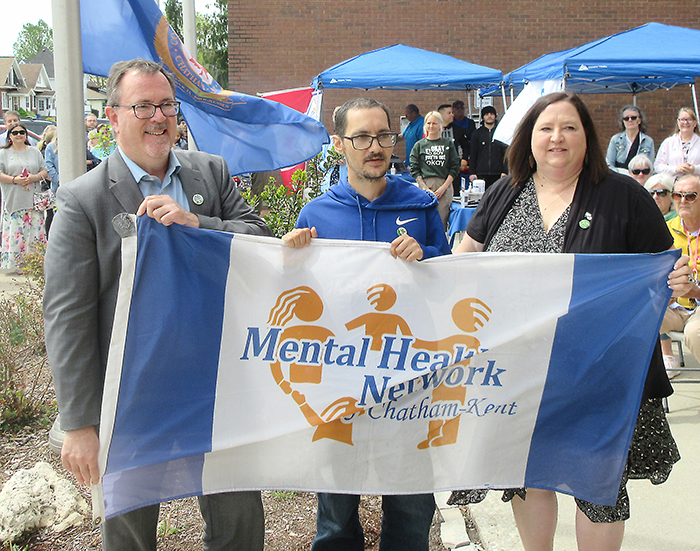
By Pam Wright
Local Journalism Initiative Reporter
Gordon Chandler is proof it’s possible to live your best life after a mental health diagnosis.
The Chatham resident, who lives with schizophrenia, hasn’t let the illness hold him back and has worked hard to achieve a meaningful and purposeful lifestyle.
“For those of you who don’t know me, I have come a long way in my journey,” Chandler told a crowd while raising a flag at the Chatham-Kent Civic Centre to mark Mental Health Awareness Week. “I live with schizophrenia but I don’t let that hold me back.”
It’s the 13th annual flag raising for the initiative and this year’s focus is men’s mental health.
Chandler, 38, said he developed symptoms shortly after high school that were “difficult to live with.
“I saw scary things that weren’t there and struggled to get out of bed,” he said. “This was made worse by not being able to find the right medications straight away and having to live with terrible side effects.”
According to Chandler, he spent time in the hospital and in group homes, but with the help of worker Kelly Gottschling, staff at Hope House and workers from the Canadian Mental Health Association and Community Living, he was able to make a recovery.
Chandler said he began attending Hope House in 2006, where Gottschling advocated for him to get on the proper medication, while also motivating him to “get out of bed to participate in activities.
“I learned valuable life skills in the group home and at Hope House, like cooking, that set me up for success and independence,” Chandler told the crowd. “I loved the socialization aspect of Hope House and met a lot of friends there. I believe the key to recovery from mental illness for men is pushing yourself to get up and face the day and seeking support.”
Chandler, who has been delivering newspapers for the past five years with the help of Community Living support worker Kim Walker, noted working and finding purpose and developing a positive attitude is also critical to success.
“I have been lucky to have a family that has been there for me,” he told the gathering. “We did everything together. My friends are important too. You could say I have a natural talent for making friends and that I have a big heart. I know that with everyone’s support, I’m not alone. I would like to say don’t give up, don’t keep to yourself and don’t be afraid to ask for help. I live with a mental illness, but it does not define me.”
Jenny Jackson, acting executive director of the Mental Health Network of Chatham-Kent, urged those in attendance to recognize the mental health challenges that men face, calling it an issue that “remains hidden in shadows.
“It’s time we recognize that mental health knows no boundaries, respects no gender and affects us all in profound ways,” Jackson said, noting a stigma around men’s mental health continues to exist.
There’s an unspoken expectation that men should remain stoic, unaffected and unyielding in the face of their struggles, Jackson explained.
“That expectation, however, is not only outdated but dangerously harmful,” she added. “Today we send a powerful message to every man, that it’s okay to not be okay, and that help is always within reach. We want you to know that vulnerability is not weakness, but rather a courageous act of self-awareness and self-care. If you are here today and struggling, please know that you are not alone. We are here to help.”
Jacksons urges everyone to offer “support without reservation,” and to be the allies that our “brothers, sons and friends need.”






